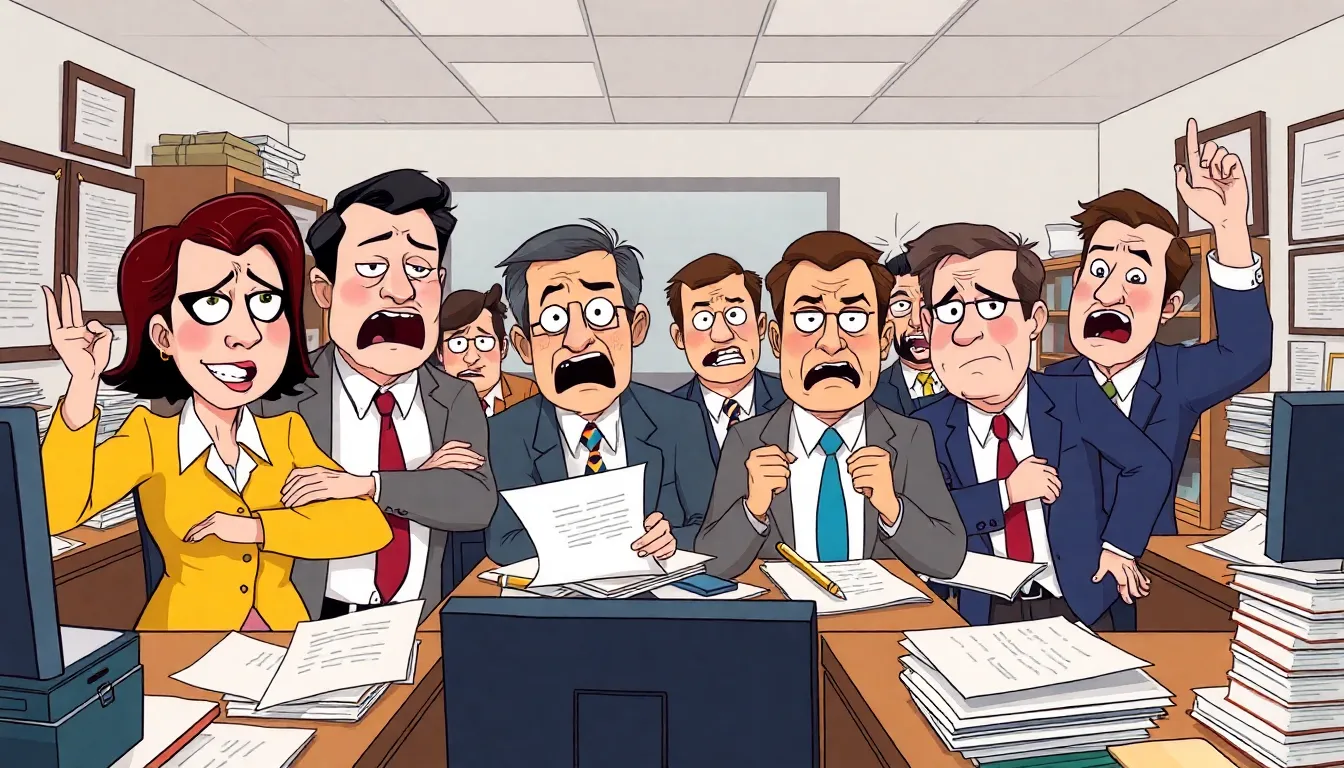In the realm of British television, few shows spark as much debate as The Thick of It. Love it or loathe it, this political satire has carved out a niche that leaves viewers divided. Some can’t get enough of the razor-sharp wit and chaotic charm, while others find themselves cringing at its relentless barrage of profanity and cringe-worthy moments.
So why do some people harbor a deep-seated disdain for this cult classic? It’s not just the foul-mouthed antics of Malcolm Tucker that ruffle feathers; it’s the show’s unflinching portrayal of political life that can feel all too real. For those who prefer their humor a little less chaotic, The Thick of It might seem like a wild ride they’d rather skip. Let’s dive into the reasons behind the mixed reactions to this iconic series.
Table of Contents
ToggleOverview of “Thick of It”
“The Thick of It” offers a satirical lens on British politics, showcasing the challenges and absurdities faced by government officials. Set in the offices of the fictional Department of Social Affairs and Citizenship, the show revolves around the chaotic life of political staffers as they manage policies and media scrutiny. Characters display a blend of ambition and insecurity, creating an environment ripe for comedic tension.
Profanity plays a significant role in the show’s humor, with characters often resorting to sharp, biting language. This stylistic choice contributes to its distinctive voice but can alienate viewers who prefer more subtle forms of comedy. Fast-paced dialogue characterizes many scenes, making the viewer’s experience intense and immersive.
Realism is another defining feature. The show captures the chaotic nature of political life, offering a raw but exaggerated portrayal of the bureaucracy and conflicts involved. However, this realistic representation can be uncomfortable for audiences, especially those seeking escapism in their entertainment.
Critical reception highlights the sharp writing and strong performances as standout elements. Fans frequently praise the show for its incisive commentary on the political landscape. In contrast, detractors cite discomfort with its abrasive style and relentless sarcasm as reasons for their distaste.
The division among viewers often stems from contrasting expectations. Some appreciate the dark humor and chaotic storytelling, while others view it as off-putting and overly harsh. Understanding these perspectives provides insight into why “The Thick of It” garners such polarized responses from its audience.
Common Criticisms

Many viewers express dissatisfaction with The Thick of It, often focusing on its abrasive elements. This section outlines the primary critiques regarding the writing style and character development.
Writing Style
First, the show’s frequent use of profanity creates a divisive experience for viewers. Fast-paced dialogue, while engaging for some, may overwhelm those unaccustomed to such intensity. Additionally, the chaotic nature of the script can lead to confusion among audiences seeking straightforward storytelling. Some appreciate the honesty of this approach, while others perceive it as excessive. Abrasive humor often alienates those who prefer nuanced, clever wit. In this light, the writing style becomes a key factor in why some audiences struggle to connect with the show.
Character Development
Character arcs in The Thick of It serve as a focal point for criticism. Many find the portrayals of political staffers one-dimensional, hindered by an overwhelming focus on chaos. Jumping from one intense situation to another can leave viewers craving deeper emotional connections. Although the characters display ambition and insecurity, their development often lacks the complexity that fosters empathy. Some appreciate the satirical take on real-life politicians, yet others find it difficult to relate. Consequently, gaps in character depth contribute significantly to polarized opinions about the series.
Cultural Context
The Thick of It creates a unique relationship with its audience, leading to a range of emotional responses.
Impact on Viewers
Viewers often experience a spectrum of emotions while watching the show. Many appreciate the sharp wit and fast-paced humor, which provide a refreshing take on political life. Others, however, feel overwhelmed by the intense profanity and chaotic storytelling. Confusion arises when rapid dialogue and complex plots obscure the main narrative. The comedic tension between characters can evoke laughter or discomfort, depending on individual preferences. Overall, the blend of dark humor and stark realities can deeply affect how audiences engage with the content.
Relatability Issues
Relating to the characters poses challenges for many viewers. Some find the portrayals of political staffers to be caricatures lacking depth and nuance. Individuals seeking genuine connections may struggle to empathize with one-dimensional character arcs. Furthermore, the show’s satirical depiction can alienate those not familiar with British politics. Audience members often feel disconnected, as the humor heavily relies on cultural references and political knowledge. The blend of absurdity and realism leaves viewers divided regarding their ability to connect with the narrative.
Comparison to Other Shows
The Thick of It stands apart in the landscape of political satire due to its distinctive tone and style. Its chaotic pacing and heavy profanity separate it from more traditional sitcoms and political comedies, which often opt for subtlety and light-hearted humor. Many fans of shows like Veep or Parks and Recreation appreciate shared themes of political absurdity, yet these series generally feature more developed characters and less abrasive language.
Similar Genres
Political satires often highlight absurdities similar to The Thick of It. Shows like Veep and The Office exhibit humorous takes on workplace dynamics and politics. Both employ exaggeration for comedic effect while maintaining a certain level of character empathy. Alternative comedies focus on situational humor or character-driven storylines, making them more accessible to broader audiences. The intense style of The Thick of It can polarize viewers who expect a more conventional approach to humor.
Audience Reception
Responses to The Thick of It reveal a clear divide among viewers. Some appreciate the sharp dialogue and dark humor, believing it reflects the chaotic nature of modern politics. Others express discomfort with the show’s use of profanity and rapid-fire conversation, which can feel overwhelming. Many fans revel in its political commentary, yet detractors argue it lacks relatable characters. This duality illustrates why the series sparks strong opinions, attracting both devoted fans and harsh critics.
The Thick of It remains a polarizing force in the realm of political satire. Its blend of sharp humor and chaotic storytelling resonates deeply with some viewers while alienating others. The show’s raw portrayal of political life often challenges audiences’ comfort zones, leading to strong reactions.
For fans, the incisive commentary and fast-paced dialogue offer a refreshing take on bureaucracy. In contrast, those who prefer a more traditional comedic approach may find the abrasive style off-putting. Ultimately, the divide in audience reception underscores the complexity of humor and the varying expectations viewers bring to the screen.




